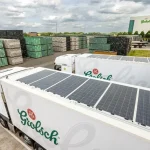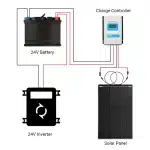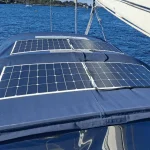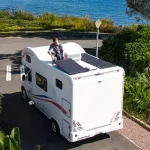Table of Contents
As the popularity of motorhome with solar panels rises, more RV owners are embracing this reliable and eco-friendly energy solution. Installing solar power for RVs offers energy independence, long-term savings, and freedom from noisy generators or campground hookups. For both enthusiasts and dealers, understanding the benefits of RV solar systems is essential to fully leverage their potential.
This guide provides an in-depth look at RV solar panels, including how to install them, their cost-effectiveness, and key considerations for selecting the best system. Whether you’re planning to add solar panels to a camper or exploring advanced motorhome solar power systems, this article will help you make informed decisions. We’ll also highlight Sungold Solar’s PA621 lightweight panels and Hi-Power portable systems, two top-tier products tailored for RVs and campers.

RV solar power basics
RV Electrical Systems
RV electrical systems typically consist of two types:
- AC Power (Alternating Current): Powers high-energy appliances like air conditioners, TVs, and microwaves.
- DC Power (Direct Current): Powers lighting, fans, and other low-energy devices. It is drawn from the motorhome’s battery bank.
How Solar Power Integrates
Solar panels generate DC electricity, which integrates seamlessly into your motorhome’s system via these components:
- Solar Charge Controller: Manages power flow and prevents battery overcharging.
- Battery Bank: Stores surplus energy for use at night or on cloudy days.
- Inverter: Converts DC electricity into AC power for household appliances.
For dealers, showcasing how solar power supports uninterrupted, off-grid functionality is a key selling point for motorhome buyers.
Why Install an RV Solar System?
Benefits for RV Owners
- Energy Independence: Solar panels allow motorhomes to go off-grid, providing power even in remote locations without hookups.
- Cost Savings: A properly configured system eliminates the need for expensive generator fuel or paid hookups.
- Eco-Friendly Travel: Solar energy is renewable, sustainable, and reduces your carbon footprint.
- Silent Operation: Unlike generators, solar panels provide noise-free energy.
Dealer Insights
For dealers, promoting motorhome solar power systems positions your business as eco-friendly and innovative. RV solar power systems are increasingly popular among eco-conscious customers, making them a profitable addition to your offerings.
RV Solar Panel Systems: Which Is Right For Me?
If you’re looking for a “set it and forget it” solution for off-grid energy, permanent roof-mounted solar panels are the ideal choice. Although the initial investment is higher, these systems are incredibly low-maintenance and provide consistent, free energy for years.
RV Solar Option #1: Permanent Roof-Mounted Solar Panels
How They Work
- Mounting and Integration: Photovoltaic solar panels are mounted on your RV’s roof, connected to your battery bank through a solar charge controller.
- Energy Collection: The panels capture sunlight to recharge your RV’s batteries while parked or even driving.
- Energy Storage and Use: Stored energy powers your DC system, running devices like LED lights, fans, and refrigerators. For additional functionality, you can add an inverter to convert DC power into AC power for high-wattage appliances.
Advantages of Roof-Mounted Solar Panels
- Convenience: Once installed, roof-mounted panels require minimal interaction. You don’t need to set them up or reposition them to capture sunlight.
- Space-Saving: These panels don’t take up valuable interior or exterior storage space.
- Seamless Integration: Hardwired systems work effortlessly with both DC and AC systems, allowing you to power devices like TVs, laptops, and coffee makers.
- Durability: Designed to withstand road vibrations and various weather conditions, these panels are a long-term investment.
Drawbacks
- Higher Initial Costs: Installation can be expensive, including labor and additional equipment like inverters and mounting hardware.
- Fixed Location: The roof-mounted panels rely entirely on the sunlight that reaches your RV’s parking spot. If your RV is in the shade, energy collection is limited.
Perfect For
- Full-time RVers and adventurers who travel frequently.
- Motorhome owners looking for a long-term, hassle-free power solution.
Pro Tip: Sungold Solar’s PA621 lightweight solar panels are excellent for roof-mounted setups, offering durability, high efficiency, and ease of installation.
RV Solar Option #2: Portable Solar Panels
For those looking to save on installation costs while maintaining access to clean energy, portable solar panels are an attractive choice. These lightweight, foldable panels are designed for off-grid living with convenience and affordability in mind.
How They Work
- Setup: Place portable panels in a sunny location, connecting them to the RV battery through a charge controller and cables (often alligator clips).
- Energy Collection: The panels collect sunlight and directly charge the battery.
- Mobility: Because they aren’t fixed, you can move them to optimize sunlight exposure while parking your RV in shaded areas.
Advantages of Portable Solar Panels
- Lower Cost: Portable solar panels are significantly cheaper than permanent setups. Kits, such as Renogy’s 200W kit priced at $469.99, provide an affordable starting point for RV solar power.
- Flexibility: Panels can be positioned in areas with optimal sunlight, even if your RV is parked in the shade.
- Ease of Use: Lightweight and foldable, they’re easy to set up and store.
- Versatility: Portable panels are ideal for smaller setups like camper vans, trailers, or weekend getaways.
Drawbacks
- Convenience: Unlike roof-mounted systems, you need to set up and take down portable panels every time you park.
- Security Risks: Portable panels are more susceptible to theft since they aren’t bolted onto the RV.
- Lower Efficiency: Portable systems may not provide the same level of energy as permanent setups due to limited size and positioning challenges.
Perfect For
- RV owners on a budget or those new to solar systems.
- Campers who frequently park in shaded areas and need flexibility.
- Part-time RVers or weekend travelers.
Pro Tip: Sungold Solar’s Hi-Power portable solar panels combine portability with durability, making them an excellent choice for RVers seeking a cost-effective and convenient energy solution.
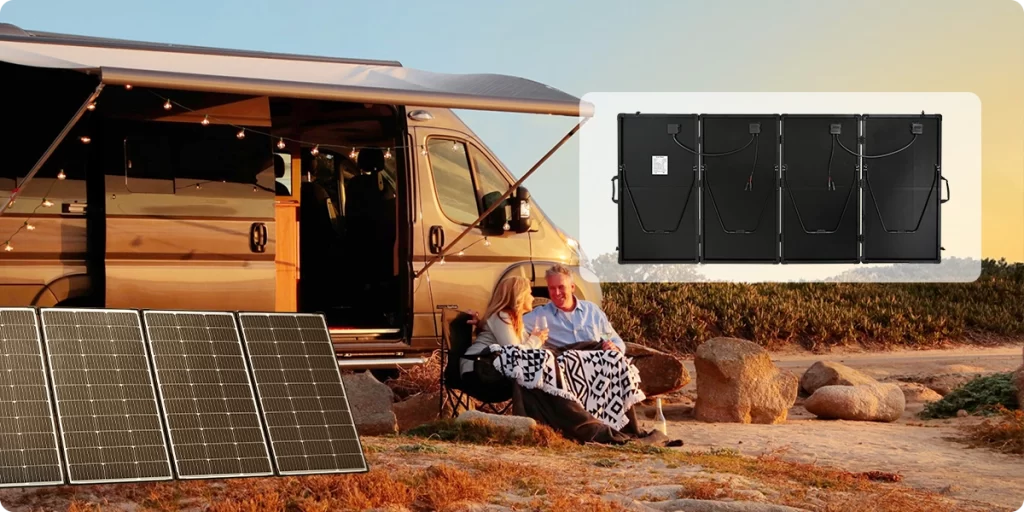
Which Option Is Right for You?
When deciding between roof-mounted and portable solar panels, consider your budget, energy needs, and travel style:
- Roof-Mounted Panels: Best for long-term, high-energy users who want maximum convenience.
- Portable Panels: Ideal for occasional campers or RVers looking for a cost-effective and flexible solution.
Both options can meet your off-grid energy needs, and combining the two can provide the ultimate flexibility. For instance, a roof-mounted setup can handle primary energy demands while portable panels supplement additional power needs.
How Many Solar Panels Do I Need To Run My RV?
Step-by-Step Energy Calculation
Calculate Daily Energy Usage:
- List all devices and their wattage.
- Multiply usage hours to find daily consumption (e.g., a fridge using 100W for 10 hours = 1,000Wh).
Consider Peak Sunlight Hours:
- Divide daily energy needs by available sunlight hours (e.g., 1,000Wh ÷ 5 hours = 200W of solar panel capacity required).
Account for Battery Storage:
- Ensure your battery bank can store enough energy for nighttime use.
System Optimization
Seasonal variations and geographic location also impact solar output. Dealers can assist buyers in configuring systems tailored to their energy needs, leveraging tools like solar calculators.
how much will it cost?
Initial Costs vs. Long-Term Savings
- Upfront Investment: Solar panels, charge controllers, inverters, and batteries can cost between $1,500 and $5,000.
- Maintenance Costs: Minimal; regular cleaning and occasional battery checks are sufficient.
- Payback Period: Energy savings from reduced generator usage and hookup fees often offset the initial investment within 3–5 years.
Maximizing ROI
High-quality options like Sungold Solar’s PA621 lightweight solar panels ensure durability and performance, providing a faster return on investment.
Advantages and Disadvantages of Flexible Solar Panels for RVs
Advantages
- Lightweight: Reduces strain on the motorhome’s roof structure.
- Adaptability: Easily installed on curved or uneven surfaces.
- Durability: Resistant to vibrations and weather conditions during travel.
Disadvantages
- Heat Dissipation: Flexible panels can overheat without adequate airflow.
- Lifespan: Shorter than rigid panels, though advancements in Sungold Solar’s technology address these challenges.
What Else Do I Need For My RV Solar Panels?
Essential Components
- Solar Charge Controller: Extends battery life by regulating power flow.
- Battery Bank: Stores energy for nighttime or cloudy day use.
- Inverter: Converts DC power to AC for appliances like microwaves and TVs.
- Mounting Equipment: Ensures secure installation of solar panels.
For dealers, offering complete solar kits simplifies the buying process for customers while boosting sales.
RV Solar System Maintenance and Monitoring
Maintenance Tips
- Clean panels regularly to maximize sunlight absorption.
- Inspect cables and connectors for signs of wear or corrosion.
- Test batteries periodically to ensure proper performance.
Advanced Monitoring Tools
Smart monitoring systems allow real-time tracking of energy production and consumption. Dealers can offer these systems as a premium add-on to improve user experience.
Final Thoughts
Motorhomes with solar panels offer unparalleled freedom and sustainability, making them a must-have for modern RV enthusiasts. Whether you’re installing solar panels on RV roofs, adding flexible camper solar panels, or setting up portable solar power systems for campers, investing in the right products ensures long-term benefits.
For dealers, integrating high-quality products like Sungold Solar’s PA621 lightweight panels or Hi-Power portable systems into your offerings meets the rising demand for eco-friendly RV solutions.
leave a message
Ready to embrace energy independence? Explore Sungold Solar’s innovative solutions for motorhomes and campers. Visit www.sungoldsolar.com to learn more about our flexible solar panels, designed for modern RV needs.


